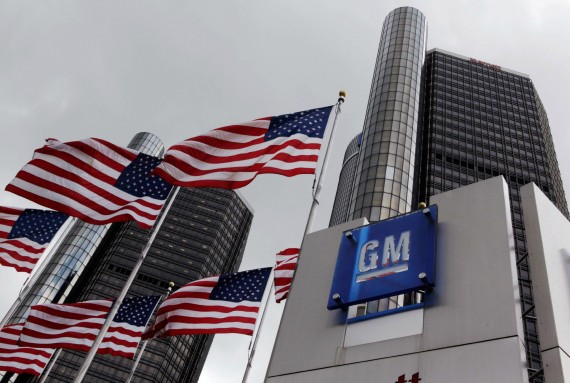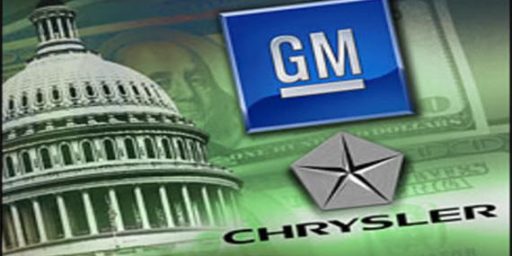Faced With Lawsuits, General Motors Is Headed Back To Bankruptcy Court
General Motors is headed back to court.
Several years after emerging from Chapter 11 Bankruptcy, General Motors headed back to Bankruptcy Court as part of its strategy to defend itself against lawsuits related to defects in its automobiles that date back to years before the company ever filed bankruptcy:
(Reuters) – A U.S. bankruptcy judge on Friday urged settlement talks in a dispute between General Motors Co and plaintiffs seeking compensation for the lost value of their cars stemming from a massive recall over a faulty ignition switch, though neither side seemed ready to negotiate quite yet.
Judge Robert Gerber, of the U.S. Bankruptcy Court in Manhattan, said he would welcome the prospect of a resolution that avoided a “monstrous battle.”
“Frankly, it would be great if whatever money is available for injured people could go to them, and not to litigation costs and attorneys’ fees,” Gerber said at a court conference with GM and the plaintiffs.
Gerber ended up deferring the idea after both sides said they would rather let the dispute play out a bit before they arrive at the bargaining table.
Gerber is the same judge who in 2009 oversaw GM’s whirlwind Chapter 11 bankruptcy case. Now facing dozens of lawsuits over a faulty ignition switch that has led to the recall of some 2.6 million vehicles, GM is asking Gerber to enforce the so-called bankruptcy shield, in a pre-emptive move aimed at staving off dozens of lawsuits from customers who say they took a financial hit from the recall.
Under the plan approved by Gerber, GM channeled its burdensome liabilities into a shell known as “Old GM,” while selling its profitable assets to “New GM,” a separate corporate entity that took GM out of bankruptcy and now operates as General Motors Co.
Accident victims are not involved in the dispute before Gerber, which concerns only claims for loss of car value.
The new entity agreed to take on certain of Old GM’s legal liabilities, including those for accidents that occurred after the bankruptcy but which involved cars made before the bankruptcy.
But New GM says it did not agree to take on liability for so-called economic loss claims like the ones it now faces, in which plaintiffs allege that their cars lost value due to the recall. The company wants Gerber to endorse that position and declare that such lawsuits can only be brought against the Old GM shell.
The New York Times has further details:
On the surface, G.M. is merely asking the judge to enforce a provision of its July 10, 2009, bankruptcy reorganization that insulated the “new” company from lawsuits stemming from accidents that occurred before that date.
But the reason for the request is far from routine. The company is trying to shut down a rising tide of class-action lawsuits stemming from its recall of 2.6 million cars because of a dangerously defective ignition switch that it now links to 13 deaths.
Asking a judge to enforce part of a restructuring happens in many bankruptcy cases. But in this situation, some bankruptcy experts say, it may be a risky move. Objections have poured into the court from plaintiffs in cases around the country, alleging that the company committed fraud during the bankruptcy proceedings five years ago by not disclosing the potential liabilities from the faulty switch, a problem it now admits was known in parts of the company for more than a decade before the recall.
“I think it’s a gamble from G.M.’s perspective,” saishoud David A. Skeel, a bankruptcy specialist at the University of Pennsylvania School of Law and the author of “Debt’s Dominion: A History of Bankruptcy Law in America.” “If I were the judge, I would not give them a carte blanche and say this litigation has got to stop. I suspect the response will be more nuanced than that.”
In fact, he and others say, the otherwise routine motion could potentially end up leading to a mini-trial of sorts, on whether or not fraud was committed. If that happens, Mr. Skeel said: “In a way, it’s we’re redoing the bankruptcy. It’s quite possible this trial could be a larger event than the real bankruptcy.”
If allegations of fraud become a focus, the proceedings could go a long way toward answering a question that two congressional investigations, countless news reports and other inquiries have not been able to ascertain so far — how high up in the company did the knowledge of the switch defect go? G.M. has largely declined to make employees available for questioning and has continually cited its own internal investigation.
The two lead lawyers representing G.M. in its motion to enforce the bankruptcy order did not return phone calls. But outside lawyers say the company may still have the upper hand. There is a generally accepted feeling that judges do not like to tamper with sales or restructuring plans and that the greater economic good of this one — which has been credited not only with saving the company, but also preventing the American economy from sinking deeper into recession — may be paramount.
Whatever the outcome for G.M. and the plaintiffs who have filed lawsuits against it, the result could have wider implications for American business.
“This may be an important case for teaching us how bankruptcy sales can relieve a company of its past mistakes,” said Richard Levin, head of the restructuring practice at Cravath, Swaine & Moore.
Ordinarily, the new corporate entity would not be responsible for debts incurred by the entity that actually entered bankruptcy. That, after all, is the purpose of Chapter 11 reorganization. There are exceptions to this general rule, though. Many of them come into play in complex bankruptcies like the one General Motors experienced. In that case, the Court had to deal with issues such as how warranty claims on vehicles purchased prior to the filing of bankruptcy would be dealt with, as well as claims related to accidents that occurred after bankruptcy in cars purchased before bankruptcy. The cases that General Motors is dealing with now don’t seem to fit into any of those exceptions, which would ordinarily mean that they would be the responsibility of “Old GM.” Of course, Old GM is essentially a shell corporation with no real assets at this point, so the real question before the Court is whether, and to what extent, New GM should be responsible for this part Old GM’s debt. Given that the new company got all of the old company’s assets, there’s a good case for the argument that the new company should be responsible here.
The other major exception that would allow the imposition of liability on the new company of the old company’s debts is fraud. If the attorneys for the claimants can demonstrate that General Motors executives engaged in some kind of pre-Bankruptcy deception regarding the defects at issue here, then the debts would likely be found to be nondischargable. There have already been numerous allegations that General Motors was seeking to hide this ignition defect from government regulators, and consumers, going well back to the early 2000s. If this can be proven, then the Plaintiffs would likely be able to pursue their claims against the new company. In either case, though, unless the parties reach a settlement here (which is entirely possible given the amount of money at stake) this case is likely to end up in the Supreme Court no matter what the Judge decides.







We bailed them out and they’ve treated this country like shit ever since. Just like the big banks. I hope they don’t get to be shielded from the lawsuits but I don’t hold out much hope anymore of big corporations in this country ever being held responsible for anything anymore.
I am not sure how much they are talking about and how many people. Just how many wrecks were there involving this small part that was defective? While some money should be paid out of course, it should not be an amount that breaks the company and costs jobs. it is also something that GM should be able to write off somehow.
@Tyrell: Tyrell – people died because of this. If it was your daughter, would you be fine with it being “written off” and “not costing jobs”?
@beth: It’s not over the deaths. GM’s trying to dismiss the suits over “loss of economic value” from the faulty ignition switches.
@Tyrell:
The lawsuit under discussion here isn’t people who got in accidents because of the defect. It’s people who own GM cars that are now worth much less at resale due to the bad PR from the defect.
Sorry I’m usually a much better reader than that! However, I still hold that people who lost value on these cars should be compensated given that GM was certainly aware of it when they declared bankruptcy. At some point can’t we stop rewarding crappy corporate behavior?
By the way, I bet Mary Barra’s thinking her dream job sure turned out to be kind of a nightmare.
This has nothing to do with the lawsuit, just a side comment:
Fox News types (of which my mother is one) hate, hate, hate GM. And electric cars. Specifically GM electric cars. Tesla comes up a lot too. It’s some very weird pathology that I just don’t get.
@de stijl: after reading the above blog you don’t get it? gm was/is such a poorly run company that they needed to be bailed out by the gov’t., (money that comes from those who pay taxes).. their wonderful volt was supposed to be the best thing since flushed toilets, and they’re about as good as what good into toilets. gm also dumped their obligations to a bunch of suppliers(mainly the non-union ones). now they’re trying to hide behind a court order to shield them from the crappy products they make- any
liberalhuman would be up in arms about such a company and their tactics. .i owned several gm vehicles, that’s why i now drive a toyota.
i can’t help you with any tesla hate, but i know where electricity comes from and it’s mainly carbon based! so clean isn’t it?
If judges are going to start talking like this, we might as well throw away our American tort law system (which, by the way, is the best in the world, just as our healthcare system used to be before Obumma turned it into a socialist nightmare). How are lawyers going to make enough money if they have to turn over most of the winnings to their clients?
Where is our sense of fairness?
Ahhhhhh…. I remember with great fondness and satisfaction all the progs on OTB bragging about how GM had paid everything back and was a great success story for Obama. To the extent of slam-dunking anyone pointing out that there were billions being lost by the taxpayers in the deal. Now we find that we are- in fact – losing Billions in the bailout deal.
No doubt that in face of yet another Obama failure the new story here for libs will go something like ” Dude, that was like 5 years ago. What difference does it make?”
Pathetic all the way around, And this Administration doesn’t even have enough time to spin all of the failures. The failures are being revealed at a rate that is simply overwhelming the Democrats.
Please don’t tell me we are going to bail them out AGAIN. They cannot make a quality product and that is the LEAST the consumer is entitled to expect. Ford and Chrysler have nothing to brag about either, a sad commentary on the US car industry. Subaru forever!
For some reason, I didn’t think bankruptcy shielded from damages owed in civil suits. It really doesn’t seem right to me.
I get the notion of being able to get a clean slate on debt. The lender took a risk and the risk failed. But in the cases of tort, someone was damaged because of wrongful conduct.
So, hypothetically, “old GM” could have killed or maimed hundreds of people, who then spent years fighting in court for damages. Then, “old GM” declares bankruptcy, reorganizes as “new GM” under essentially the same ownership, and walks away from the liability? How is that possible?
We don’t allow individuals to do that, do we?
I don’t think we will bail them out again-we are just going to let them screw millions of customers who bought their cars out of being able to recover their losses.
If this was a company that didn’t sign up for a bail out and his a problem of this nature for a decade-those thinking GM should have no liability would be the first in line to say that company should be liable.
The fraud is a real issue. If regular people fraudulently hide things during bankruptcy proceedings they can often go to jail for their fraud. GM because it got bailed out by the taxpayers is seeking a free pass for its fraud and those who supported the bail out are now lined up to support the fraud.
So, when Biden said “Bin Laden is dead and GM is alive,” it was actually “Al Qaeda and GM are both still going and killing Americans,” thanks to the Obama administration?
This is yet another argument as to why it was such a bad thing for the Obama administration to ignore the existing bankruptcy laws. Maybe this would have come out in normal proceedings, maybe not; we’ll never know. All we do know is that it didn’t come out in the Obama administration’s misappropriation and mishandling of the process.
@James Joyner:
No, we don’t, and we don’t allow corporations to do it either but it’s because of more fundamental considerations of due process, specifically notice and opportunity to be heard. Here the debtor knew of the problem and took steps to conceal it, but fatally perhaps it failed to disclose the liability. Generally, no notice means the debtor loses.
As a practical matter the bankruptcy court was certain to let some of the state law suits play out to liquidate the damages.
@James Joyner:Personal injury claimants were getting shafted at the time that GM filed bankruptcy, since their claims were following old GM which was undercapitlized. I think Old GM had some abandoned properties and other assets, that have already probably been whittled away.
The bankruptcy policy question is always whether the reorganization plan is better than liquidation. If GM had dissolved several years ago, the new plaintiffs would not be in any better position, since all of the company’s assets would have gone to secured creditors and other known claimants.
@rudderpedals: Are you saying that those handling the bankruptcy committed a fraud by not identifying known claims? Or are you saying that the underlying lawsuits are fraud lawsuits and should be treated differently?
@PD Shaw: I’m not ready for the referral to the US atty yet – it doesn’t look like the creditors are using the f word either, or at least I haven’t seen a well-pled, Iqbal-compliant complaint of fraud. It seems to me the debtor should and will have a difficult time convincing the bankruptcy court it deserves protection in spite of its material omissions and false oaths.
I don’t think the state court actions are fraud claims, are they? I’m pretty sure I’m not addressing what you’re getting at.
I do not know all the details here, if this was an in-house part or had been farmed out. This thing of farming some of the parts out caused disaster for Toyota a couple of years ago and recently the Boeing Dreamliner. I don’t know if GM still uses its own parts or not: Delco Remy, AC (I still buy and install their plugs), Goodwrench, and Rochester. It would be hard to imagine a Delco or AC part failing. Those parts were reliable and lasted. Made in America!
I am not sure who runs GM now; I heard that Ford Motors just got a new president. Ford always seemed to do best when a Ford family member was in charge. But Ford has had its share of problems over the years due to unwise decisions.
What is needed is for the car companies to have CEO’s who know how cars are built and run from the ground up; can change plugs and oil, and would not mind at all taking a spin out on a racetrack. They should visit the plants and dealers regularly. That is how it used to be and that is why the Big 3 were on top: they were ran by car people! Not bankers, economists, or lawyers. Our car companies should set the trend in design, engineering, and technology, not copy others.
Pontiac had been making some good cars (G6, Solstice, Vibe) and was showing a profit when the plug got pulled. Why?
Oldsmobile should have been turned into an entirely experimental division. Think of what they could have on the road now: hydrogen and electric cars. Saturn had a good plan at the start, but got away from it and started making cars that looked like Chevies.
I hear people knocking American car companies now a days. Let me tell you I have owned both GM and Ford products over the years. They were reliable, powerful, comfortable, stylish, and you did not need a bank account to maintain them. Volt has good reviews, but is too expensive.
Imagine an electric Corvette that can go 200 mph and get 200 miles on a charge. That would turn some heads! That is the kind of thinking needed.
@Tyrell:
The secondary market is full of conversions and re-manufactured electrified ‘vettes. Here’s one example that’s in production. I haven’t been able to discover how much they are but I’m guessing pretty pricey.
@Dave Schuler: Thanks for that – I know of other conversions to ev but that is the first I have heard of a -vette.
Government intervention doesn’t work, and this is one more chapter to add to that book.
@rudderpedals: I guess I’m not sure I understand your original comment.
Knowledge Plus Concealment Plus Failure to Disclose = Some sort of Fraud
Maybe fraud is more than you meant to imply, but I guess I’m just not sure of enough of the background to know when GM knew what is supposedly knew and when it had a duty to disclose. There is a bankruptcy storyline in which someone, including the Administration, actively sought to arrange matters so some historic liabilities would be left with an undercapitalized “old” company, and then there is a storyline about (from what I can tell) people in the engineering/safety division of G.M. not communicating or being heard by people needing to initiate a recall.
Best cars over the years:
57 Corvette
55 Chevy
63 Ford Galaxy Fastback 390 cu in
63 Chevy Impala SS 327, 2-4 barrel carb
66 Ford Mustang 289
66 Chevelle 396
68 Plymouth Hemi
68 Olds 442 Hurst
69 Mercury Cyclone 429 cu in Boss engine (600 hp – most powerful production engine ever built in US)
71 Dodge Charger – “Dukes of Hazard”
69 Pontiac GTO (The Judge)
72 Pontiac Firebird Eagle
79 Camaro Z28
@Tyrell: Best AMERICAN cars, perhaps. But any list of “Best cars” that excludes the Jaguar E-Type and the Ferrari 365 GTB/4 (aka “Ferrari Daytona”) is, at best, libelous and obviously the product of a criminally diseased mind.
@PD Shaw: We’re lawyers but I think the lingo is getting in the way. I take Bankruptcy Fraud as a term of art meaning the offense in title 18. IMO vicarious liability for the mal-engineering and concealment isn’t likely to satisfy the crime’s mens rea element. Even though it may not be criminal the omission itself deprived the creditors of notice and an opportunity to be heard and to meaningfully object pre-confirmation (the process that’s due). Having been deprived of due process the omitted claimants ought not be bound by the confirmation.
@James Joyner: Certain things aren’t discharged in bankruptcy. Case law leans towards not making punitive damages dischargeable. Awards in civil suits usually aren’t considered punitive.
(Other things not dischargeable: taxes, child support, etc…)
@rudderpedals: How much of this is a secret deep plan vs. a bunch of people being goofballs and someone else deciding to deep-six the fatal report?
And it looks like the rest of the squawking has been about the lower resale value of the cars because of the switch problem.
I think it will be hard to make the fraud charges stick to the point that they’ll unwind the bankruptcy. Much more likely that they’ll just shrug their shoulders and say: “guess the new GM has a liability problem to deal with.”
@grumpy realist: I agree with you. I think the chances of unwinding are somewhere between zero and none and the liabilities will follow the assets to the new GM.